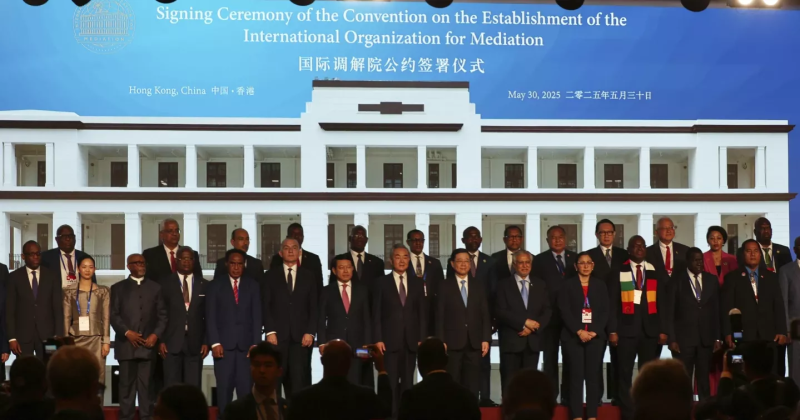- Bangladesh rejects India’s advice; vows free, fair polls |
- Hadi’s condition very critical: Singapore Foreign Minister |
- Asia-Pacific hunger eases, Gaza pipeline fixed, Europe hit by flu |
- UNRWA Situation Report on Crisis in Gaza & Occupied West Bank |
- Intimidation or bloodshed cannot halt Bangladesh’s march to democracy |
China forms global mediation group with 30 nations

Chinese Foreign Minister Wang Yi (centre) attends the signing ceremony of the Convention on the Establishment of the International Organization for Mediation, held in Hong Kong.
China has established a new international organisation dedicated to resolving global disputes through mediation, with over 30 countries signing on as founding members during a formal ceremony held in Hong Kong on Friday.
Representatives from countries including Pakistan, Indonesia, Belarus, and Cuba endorsed the Convention on the Establishment of the International Organization for Mediation (IOMed). The initiative, spearheaded by China, aims to promote peaceful dispute resolution and foster greater cooperation across nations.
Foreign Minister Wang Yi stated that China has long advocated for resolving conflicts through dialogue, mutual understanding, and consensus.
“The establishment of the International Organization for Mediation helps move beyond the zero-sum mindset of ‘you lose, I win,’” he said. “It reflects China’s commitment to contributing wisdom and solutions for global peace.”
The headquarters of the new body will be based in Hong Kong, which is being positioned as a hub for international legal and dispute resolution services. Wang noted the city’s unique legal environment, combining common law traditions with features of the Chinese legal system, as particularly suited for this role.
The mediation body is being promoted as the first intergovernmental legal organisation of its kind. Officials say it will complement existing mechanisms such as the International Court of Justice and the Permanent Court of Arbitration by offering a more flexible, dialogue-focused approach to resolving disputes.
Chief Executive of Hong Kong, John Lee, said the organisation could become operational by the end of this year.
The launch event drew participation from around 50 countries and 20 international organisations, including representatives from the United Nations.
Legal experts view the new platform as a significant addition to the global dispute resolution landscape.
Professor Yueming Yan, from the Chinese University of Hong Kong, said the organisation introduces “a structured, institutionalised form of alternative dispute resolution — namely mediation — on a global scale.”
Professor Shahla Ali, of the University of Hong Kong, noted that IOMed could handle a broad range of conflicts, including disputes between states, between a state and a foreign national, and international commercial disagreements.
“Such conventions offer opportunities to explore new methods,” she said, noting the rising global interest in mediation, particularly for resolving investor-state conflicts.
The formation of IOMed is seen as a strategic step by China to expand its influence in global governance, particularly among developing countries, amid evolving geopolitical challenges and increasing calls for reform in the international legal order.

